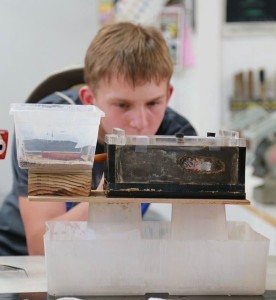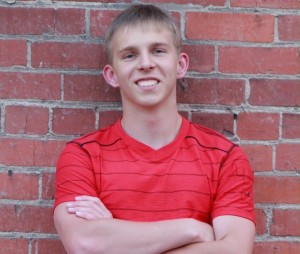When he was in second grade, Miles Maxcer unknowingly sat on an anthill. That’s when the fun began.
The ants started stinging him so he ran to the playground supervisor, who began ripping at his clothes to get at the ants.

“That was traumatic,” remembers Miles, now a senior at Moscow High School. “I was not a fan of ants in any way.”
When his sixth grade teacher assigned her students to research and write about something they disliked or feared, Miles got his first ant farm.
“That’s when I started learning about their biology and watching them cooperate,” Miles said. “Now I’m just enthralled by them. And when you learn something cool, you want other people to enjoy it, too.”
His passion to learn all he can about ants led Miles to complete several independent study projects, travel to an entomology camp in the Southwest desert and set up an online community with other ant hobbyists and professional researchers.
Sam Hoogsteen, who teaches history and leadership at Moscow High and serves as a student advisor, said Miles combines a researcher’s mind with a servant’s heart.
At high school games, Miles will make the rounds to make sure everyone is having a good time, Hoogsteen said. After the event, he’s the first to start cleaning up the bleachers.

Miles has an intense focus on learning coupled with a soft spot for family and community.
“He is a great kid who leads by example,” said Erik Perryman, principal at Moscow High. “He’s the kind of kid we’re proud to have here and proud to send out into the community.”
Hoogsteen said Miles was instrumental in making the new leadership class available at Moscow High. Miles went to the school board and persuaded them it would be good for students to learn about leadership and put it into practice.
“He wants to leave Moscow High better in every way, not only for current students, but for his younger siblings,” Hoosteen said. “He wants them to have a great high school experience.”
After winning the state Letters About Literature essay competition earlier this year, Miles wrote a follow-up essay, calling attention to the annual competition, pointing out how reading helps develop critical thinking skills.
Miles puts his leadership skills to use as president of the associated student body at Moscow High. He’s also president of the science club and a member of the Human Rights & International Club, Future Problem Solvers and Palouse Pathways Scholarship Club, a career-readiness endeavor that helps students apply to colleges or prepare for other training beyond high school.
When Miles sets his mind to something, he can be like the ant and the rubber tree plant, said Gretchen Wissner. The recently retired teacher got to know Miles through the Extended Learning Internship program. Students enrolled in the honors-level ELI program work with a mentor to explore a topic that interests them. Requirements of the semester-long program include 30-100 pages of writing, plus keeping a journal and documenting their research. At the end of the semester, ELI students give a 20-minute oral presentation to an audience of 50 to 300 people.
ELI is reserved for high school juniors and seniors, but Miles approached Wissner as a freshman. She advised him to wait at least a year, as he had plenty on his plate. Instead, he came back to her office every day for a week.
“I said, ‘are you going to come here every day to harass me until I let you take an ELI?’ ” Wissner recalled. “And he said, ‘I’ve been told gentle harassment will work with you.’ What could I say? And he was, of course, phenomenal in the ELI program.”
But Miles’ ELI project got off to a rocky start. His objective was to observe a particular species of carpenter ant and learn how they interact with aphids. Unfortunately, he ordered the wrong kind of aphids, the only species available at the time and the only one that would not work for his project.
“To see all the work I’d done just fall away was actually a very valuable learning experience,” said Miles. “I realized that researchers encounter setbacks like that all the time.”
Not to be deterred, Miles was observing ants in a Moscow nature park when he noticed some peculiar behavior. Ants of one species raided the nests of other ants, stealing the larval stages and taking those babies back to their nests. When they matured, the kidnapped ants became the workers that foraged for food for the colony.
Fascinated, Miles collected samples of the ants and took them to professor Frank Merickel at University of Idaho, who helped him identify the insects as Amazon slavemaker ants of the genus Polyergus.
“It was a lot of fun sharing the slavemaker ant story during my ELI presentation,” said Miles. “People think, ‘This is crazy’— the fact that these ants have been taking other ants as slaves for millions of years and their behavior hasn’t really changed because it’s been very successful.”
That eagerness to share what he’s learned is another hallmark of Miles’ personality, according to Lee Anne Eareckson, his honors biology teacher.
Eareckson’s students raised three-toed salamanders in the classroom as a way of studying development from egg to adult. At the end of the course, students had the option of taking their live salamanders home.
“Miles found a way to build a habitat for his salamander that provided all its needs,” said Eareckson. “You can’t have them too wet, but you certainly can’t let them dry out.”
Once Miles had perfected the habitat, he took orders from fellow students and built habitats for them, selling the salamander homes only to cover the cost of materials.
“That’s just another example of Miles wanting to share his fascination with nature,” said Eareckson.
He has led workshops for younger kids at the Moscow High outdoor classroom and given numerous presentations about ants both to his peers and to elementary students.
“I’ve always focused on outreach,” Miles said. “What good is science if people don’t know about it and accept it?” He sees part of a researcher’s role as bridging the gap between the scientific community and the public.
When he was a sophomore, a professor recommended him for the Ants of the Southwest program, sponsored by the American Museum of Natural History. Miles applied for the 10-day program to study with some of America’s best myrmecologists in the Chiricahua Mountains of southeastern Arizona.
“When they learned I was only sixteen, they rejected my application,” Miles said. The program is designed for graduate students, and participants had to be at least 18 — a detail Miles and his sponsor had overlooked. But Miles persisted until the board agreed to revise its minimum age requirement and let him attend, if he could bring an adult chaperone.
“My grandparents went as my guardians, and that worked out great,” said Miles. “They’ve been a big part of my life; I have a really special connection with them.”
His grandmother, Carol Mallory-Smith, teaches crop science at Oregon State University and is one of Miles’ role models.
As he enjoys his final year of high school, Miles is busy applying for scholarships and researching colleges where he can pursue his ant research without having to live too far away from his family.
Like the cooperating ants he loves to observe, Miles knows he doesn’t succeed all on his own. He appreciates the role models who’ve helped him along the way, starting with his father and mother, Chris Maxcer and Leslie Sattler of Moscow.
“I look up to both my parents for a lot of reasons,” he said. “My dad shares my passions and my way of thinking, while my mom sets an example with her caring nature.”
